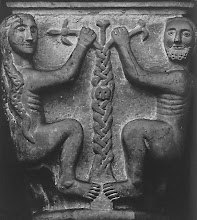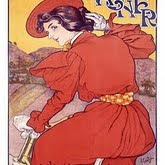(p. 88)
Although he’s apparently the youngest (his little Rasta-beard is barely
down and feathers),
most casually connected (he hardly glances at the girl he’s with, though
she might be his wife),
half-sloshed (or more than half) on picnic-whiskey teen-aged father,
when his little son,
two or so, tumbles from the slide, hard enough to scare himself, hard
enough to make him cry,
really cry, not partly cry, not pretend the fright for what must be some
scarce attention,
but really let it out, let loudly be revealed the fear of having been so
close to real fear,
he, the father, knows just how quickly he should pick the child up, then
how firmly hold it,
fit its head into the muscled socket of his shoulder, rub its back, croon
and whisper to it,
and finally pull away a little, about a head’s length, looking, still concerned,
into its eyes,
then smiling, broadly, brightly, as though something has been shared,
something of importance,
not dreadful, or not very, not at least now that it’s past, but rather
something . . . funny,
funny, yes, it was funny, wasn’t it, to fall and cry like that, though one
certainly can understand,
we’ve all had glimpses of a premonition of the anguish out there, you’re
better now, though,
aren’t you, why don’t you go back and try again, I’ll watch you, maybe
have another drink,
yes, my son, my love, I’ll go back and be myself now: you go be the
person you are, too.
I have never really liked C.K. Williams before—usually the poems included in anthologies by him have been boring to me, but I loved this one. The details are exactly right—I have seen this teenage father in the park, I'm sure. Typing the poem out I discovered that, unlike Whitman who writes long lines that go on and can be broken wherever it’s necessary to fit on the page, Williams breaks his lines purposely—long and then short. The line-breaks themselves show the rhythm of the breath—I always pause (and I think most readers do naturally) on the last word of a line. And that pause gives an emphasis to the last word of the line and then an emphasis to the words in the short line. I feel laughter and joy when I read this poem—that some portion of parenting wisdom comes instinctively and is available to us all, that we and our children can be the people that we are and still tend to each other. I love the way this poem is told, thoughts and emotions unfolding, correcting themselves, just as if we were there watching this father and son at the park ourselves.
skip to main |
skip to sidebar


All text (excluding quoted poems and comments) within Matter | Pattern by Emma J is licensed under a Creative Commons Attribution-Noncommercial-Share Alike 3.0 United States License.
living with poetry
"Let our words be as necessary and useful as once were words of magic.
This is an unachievable ideal."
Anna Swir (1909 - 1984)
This is an unachievable ideal."
Anna Swir (1909 - 1984)
. . . . and elsewhere
Matter | Pattern

matter [ME matere, fr. OF matere, matiere, fr. L materia] tree trunk (<"matrix," the tree's source of growth) matter, subject, physical substance, wood for building, fr. mater mother
mother Based ultimately on the baby-talk form ma- 2 [Indo-European ma - 1 <"good" with derivatives meaning "occurring at a good moment, timely, seasonable, early, ripe" ; ma- 2 <"breast" an imitative root derived from the child's cry for the breast, a linguistic near-universal found in many of the world's languages; ma- 3 <"damp ") [ME moder, fr. OE modor, akin to OHG muoter, ON mothir, L mater (maternal, maternity, matriculate, matrix, matron), Gk meter (metro-, metropolis [<"mother city]; Demeter [< "god-mother"], Skt matr]
meter [ME meter, metre, fr. OE & MF, fr. L metrum, fr. Gk metron (<"measure" ) fr. IE root me-] meter, metrical, diameter, geometry, metronome. Suffixed forms mens, men-ot (<"moon, month") an ancient and universal unit of time measured by the moon (menarche, meniscus, menopause, menses, menstrual, bimester, semester, trimester).
poetry [fr. ME poet, poete fr. OF poete, fr. L poeta, fr. Gk poietes, poetes <"maker, composer, poet, fr. poien to make, do , create, compose"] akin to Skt cinoti <"he gathers, heaps up, piles in order," OSlav ciniti <"to arrange, to pile up"
padre from papa, a child's word for "father," a linguistic near-universal found in many languages. [IE root pa- <"to protect, feed" (fodder, forage, pabulum, food, foster, pasture, repast, pastor <"shepherd, protector") (ME fader, fr. OE faeder; akin to OHG fater, ON fathir, Goth fadar, L pater, Jupiter [<"god-father"], patrare [<"to bring about"]; Gk pater, Skt pitr) patrician, patrimony, patron, pater, paternal
pattern [ME patron, fr. MF, fr. L patronus (<"master, pattern") fr. L defender, protector, advocate, fr. patr-, pater (<"father") a fully realized form, original, or model accepted or proposed for imitation, archetype, exemplar.
mother Based ultimately on the baby-talk form ma- 2 [Indo-European ma - 1 <"good" with derivatives meaning "occurring at a good moment, timely, seasonable, early, ripe" ; ma- 2 <"breast" an imitative root derived from the child's cry for the breast, a linguistic near-universal found in many of the world's languages; ma- 3 <"damp ") [ME moder, fr. OE modor, akin to OHG muoter, ON mothir, L mater (maternal, maternity, matriculate, matrix, matron), Gk meter (metro-, metropolis [<"mother city]; Demeter [< "god-mother"], Skt matr]
meter [ME meter, metre, fr. OE & MF, fr. L metrum, fr. Gk metron (<"measure" ) fr. IE root me-] meter, metrical, diameter, geometry, metronome. Suffixed forms mens, men-ot (<"moon, month") an ancient and universal unit of time measured by the moon (menarche, meniscus, menopause, menses, menstrual, bimester, semester, trimester).
poetry [fr. ME poet, poete fr. OF poete, fr. L poeta, fr. Gk poietes, poetes <"maker, composer, poet, fr. poien to make, do , create, compose"] akin to Skt cinoti <"he gathers, heaps up, piles in order," OSlav ciniti <"to arrange, to pile up"
padre from papa, a child's word for "father," a linguistic near-universal found in many languages. [IE root pa- <"to protect, feed" (fodder, forage, pabulum, food, foster, pasture, repast, pastor <"shepherd, protector") (ME fader, fr. OE faeder; akin to OHG fater, ON fathir, Goth fadar, L pater, Jupiter [<"god-father"], patrare [<"to bring about"]; Gk pater, Skt pitr) patrician, patrimony, patron, pater, paternal
pattern [ME patron, fr. MF, fr. L patronus (<"master, pattern") fr. L defender, protector, advocate, fr. patr-, pater (<"father") a fully realized form, original, or model accepted or proposed for imitation, archetype, exemplar.
Blog Archive
-
▼
2007
(31)
-
▼
November
(25)
- “Winter Verse for His Sister,” by William Meredith
- from "Three Poems for a Twenty-Fifth Anniversary,"...
- “Sent to Her Elder Daughter from the Capital,” by ...
- “September, the First Day of School, #1,” by Howar...
- “For a Five-Year-Old,” by Fleur Adcock
- “Night Terrors,” by Alan Shapiro
- “Instinct,” by C.K. Williams
- "To my Daughter" by Stephen Spender
- "A Cradle Song" by W.B. Yeats
- "The Tempest - to my daughter Miranda" by Stephen ...
- "Morning Song" by Sylvia Plath
- "Five a.m., the Ninth Month" by Jacqueline Osherow
- "After Midnight, the Fifth Month" by Jacqueline Os...
- "Infertility" by Edward Hirsch
- "My Husband before Leaving" translated by J. Mouss...
- "Lesson" by Forrest Hamer
- "Letter of Recommendation" by Yehuda Amichai
- "Those Winter Sundays" by Robert Hayden
- "I Ask my Mother to Sing" by Li-Young Lee
- "Clearances" by Seamus Heaney
- "Portrait of my Mother on Her Wedding Day" by Celi...
- "The Journey," by David Ignatow
- "Nikki-Rosa," by Nikki Giovanni
- A Poem a Day for 30 Days: #1“There Was a Child Wen...
- Where I'm Coming From: Biases and Blindspots
-
▼
November
(25)
I am

All text (excluding quoted poems and comments) within Matter | Pattern by Emma J is licensed under a Creative Commons Attribution-Noncommercial-Share Alike 3.0 United States License.

